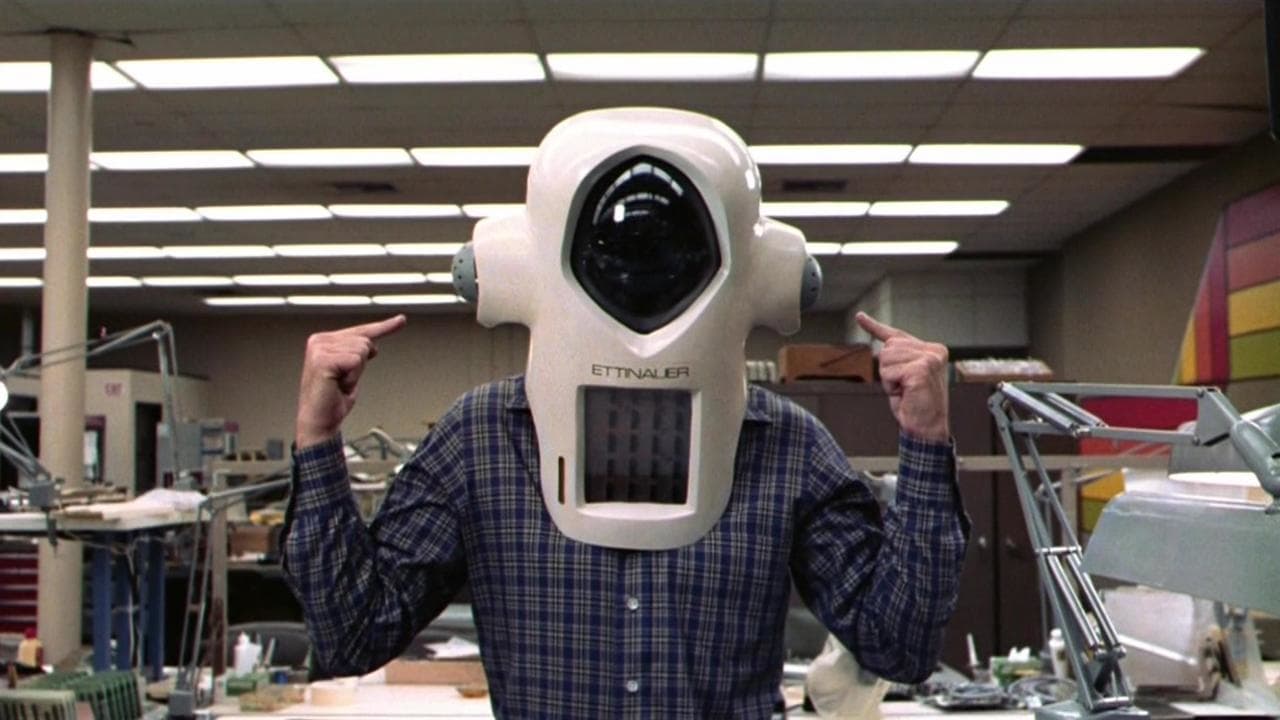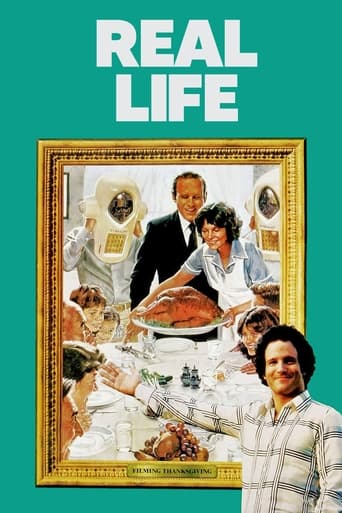

This film has one funny sight gag - the camera men with their high-tech (for its time) helmet cams prowling the Yeager and Brooks households like voyeuristic aliens. And that's it. Otherwise, it is a static, flat satire that goes nowhere. I'm amazed to read some other comments describing Brooks' first film as "complex." It's consistently dumb and obvious and desperate - the "perfect" family is actually dysfunctional, the black academic is a prig who resents being racially stereotyped, the Hollywood producer only cares about making money not art, a gynecologist is actually a baby trader who was ambushed by "60 Minutes" (sounds funnier than it plays) -- and so on. Ha ha. At nearly every turn, Brooks sucks the humor out of every potentially humorous situation. He doesn't know how to pace in the longer format and the film feels horribly padded, as well. I sat there stone-faced for a little over an hour and a half waiting for the humor to kick in, charitably chuckling here or there.Of course with the explosion of reality programming over the last decade, one would think that this film was ahead of its time. But Brooks botches it by focusing more on himself and the totally unfunny scientific institute. We don't even meet the Yeagers until about a half hour into the picture. There is absolutely no need for the scientific institute in the film, and Brooks should have remained OFF camera, goading and cajoling the Yeagers into being more "real" from behind the scenes. That might have been funny. But what we get is Brooks moving into the house next door (not funny) and expecting what? This is where the movie makes no sense. Does he want conflict or the "perfect family" being perfect? Because when he gets conflict, he seems dissatisfied, and the institute reacts with grave concern that jeopardizes the entire project. But isn't that the whole point? Why would the institute even become involved unless they wanted to study the ups and downs and everyday struggles of a typical American family? The whole concept is half-baked and hopelessly confused.This film makes so many poor choices. Why would the studio send the Yeagers on a two-week trip to Hawaii? It's not funny and serves no purpose. The film within the film is supposed to be about the film-makers' callous intrusion into the Yeagers' life, not their generosity. Generosity isn't funny. When the Yeagers return, Brooks opts to give them an hour to themselves. Again, how is this funny? He should be right on top of them from the first moment and never let up. He shouldn't live in the house across the street, he should live IN the Yeagers' house. Time after time, Brooks shys away from where the laugh is. When the documentary finally starts filming, the wife complains of menstrual cramps at the dinner table (not funny) which triggers an unfunny argument with husband Charles Grodin, and we see that reality is messy, unpleasant. Might have been funny or interesting if the film had built to that moment, showing the Yeagers gradually breaking down under the constant scrutiny of their lives. But it happens with no build-up, no tension, no funny.Strangely, Brooks seems bored with the Yeager family. They never come into focus, particularly the children. The young son is given nothing to do and barely registers. The daughter gets one junior-high-school-drama queen scene, then is forgotten. The wife flirts with Brooks early on (not funny) but that's quickly dropped. Why would the wife possibly invite Brooks to film her visit to a gynecologist? Not funny. Might have been funny if she had let it slip she had an appointment with the gynecologist and Brooks had tailed her there and surprised her at the office. And Grodin, a very funny actor, is completely wasted in the bland role of the bland father trying to maintain his bland image.Brooks ill-advisedly makes himself the star, and he just isn't at the top of his game here. His neurotic ramblings don't have much bite, his character isn't sharply enough written, and his goals never become clear. I should have been tipped off in the first scene. Brooks is schmaltzily introducing himself and the institute representatives to the town. The black academic is uncomfortable in this setting and doesn't stand up when introduced. Brooks jokes that if the audience is wondering why he didn't stand it's because he "doesn't eat much." Huh? Oh, I guess I just don't get that complex Brooks humor.
... View MoreAlbert Brooks wrote and directed this goof on the PBS landmark "An American Family" and it's hysterical. Trying to record the day to day banalities of an average American family, film-maker Brooks and company are as intrusive as possible while trying to be invisible --- the cameraman wears large orb-like headgear.As the "everyman," Brooks wisely casts Charles Grodin, then at the height of his career and perfect playing the kind of inept father/husband just itching to be caught doing the most absurd things. Nobody is better at losing their grip than Grodin and Brooks eggs him on until he explodes. Brooks doesn't just film the family, he invades their lives and captures a lot of uncomfortable moments like a gynecological exam! REAL LIFE is a masterpiece of comic discomfort.
... View MoreAny Albert Brooks fan who has not seen his first glorious feature is truly missing out. As anyone can attest, Brooks has the rare gift of turning ordinary human moments into riotously funny scenes, and this film is full of such moments, plus much more subversive material, like the way Grodin's character repeatedly comes perilously close to committing a felony against his family.Perhaps the greatest joke of all is that while the character "Albert Brooks" continuously states how he is documenting real life, we all know that this is really a star vehicle for him. He is more concerned with how much everything costs, like the head-held cameras (for those who haven't seen it, imagine the result of torrid affair between Dave Bowman and the Hal-9000). This film, more that anything, is a satirical take on how Hollywood subverts what is really "real life," all this coming from a director with as great a grasp on how humans relate to one another than anyone.
... View More'Real life' is the perfect send-up of the worst scenario possible for a film maker shooting a documentary, i.e., what happens when your subject matter loses interest in the project before completion? Albert Brooks, as the seemingly besieged director of this 'loaf of reality' year long vigil with a typical American family, walks a fine line between egomania and neuroticism and scores with broad belly laughs both ways. Charles Grodin as the head of the suburban clan from which this film within a film emanates exudes his special brand of bland exuberance at the beginning of this captive camera stakeout inside his home(and everywhere else he may go) provided his life is depicted as letter perfect from day to day. When such is not the case and the obtrusive lenses are interfering with his job as a veterinarian, (in a sequence that has to be seen rather than described) then Grodin regards the camera presence as nothing more than an albatross and mentally switches himself off. Albert Brooks, meanwhile, never says quit. Every so-called hair in the eye of the lense is still a perfect scene regardless of the participation or lack of it, thereof, from his celluloid family. For Brooks regards this film as 'paramount'(oops) over the desires of his cast of characters. Brooks facile mind works methodically from beginning to end. From his perspective, nothing can go wrong, everything is in its place with a place for everything. So when his documentary and the human equation around it blow up in his face , his conferences with colleagues are hilarious as he tries various remedies to salvage not only his project but his self-image. Brooks is a comic delight as a man who cannot take criticism regarding his methods and his interaction with project staff are decidedly one-sided, but in the capable hands of this farceur, his myopic viewpoint is always good for guffaws galore. Real life should be this funny.
... View More